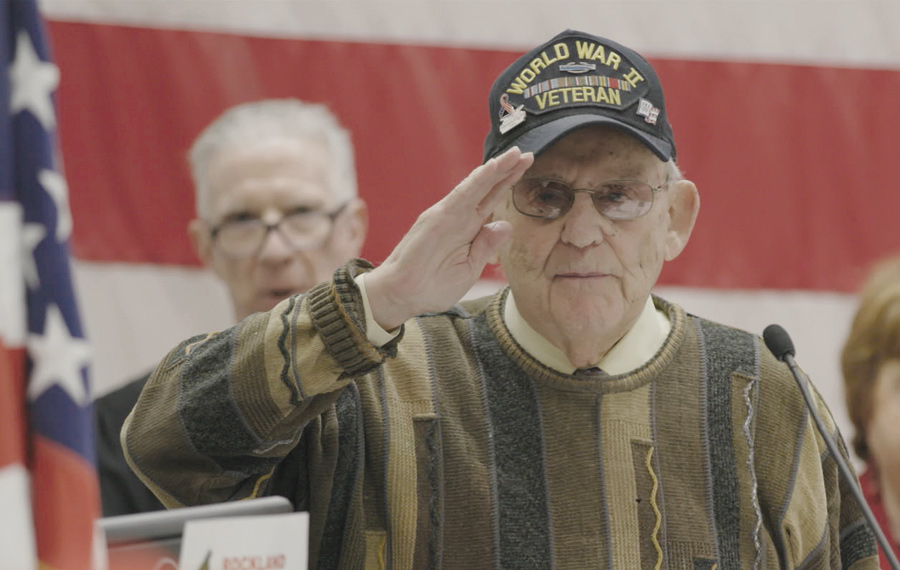 Scene from “Liberation Heroes”
Scene from “Liberation Heroes” In May 1945, Allied soldiers liberated the barely-living Holocaust survivors from concentration camps in Europe. The horrors these veterans witnessed are documented in “Liberation Heroes: The Last Eyewitnesses,” premiering May 1 on Discovery to coincide with Holocaust Remembrance Day.
Drawing on witness testimonies from the Visual History Archives of the USC Shoah Foundation and marking the foundation’s 25th year, the documentary also honors military veterans on the 75th anniversary of D-Day (June 6).
“The liberators have a very unique perspective. They didn’t really know what they were going to experience and it changed their lives forever,” producer June Beallor, co-founding executive director of the Shoah Foundation, told the Journal.
“They tell very personal stories about their experiences,” Beallor said, “and the message is very powerful now that anti-Semitism, xenophobia and isolationism are on the rise. We don’t want this type of thing to happen again.”
Producer Andy Friendly, who joined the Shoah Foundation board several years ago, was motivated to make “Liberation Heroes” to honor his late father, Fred Friendly, later the president of CBS News, was a master sergeant in the Army who helped liberate the Mauthausen concentration camp. He wrote about it in a letter to his mother, which is recited in part in the film. The late Elie Wiesel also is highlighted in the film, and broadcaster Edward R. Murrow can be heard reporting from Buchenwald for CBS News. Murrow later created “See It Now” with Fred Friendly.
In addition to the archival testimonies, Andy Friendly interviewed a few living veterans of the liberation “to celebrate these heroes, who won’t be with us that much longer, and get them on camera to tell their stories,” he said. “It’s the fundamental mission of the Shoah Foundation to give testimony to assure that these stories can never be refuted and that they’re documented for future generations. For Holocaust deniers, this is living proof [that it was real].”
One of these veterans is Alan Moskin, a 92-year-old retired attorney who served in the Army under Gen. George Patton. He was 18 when his regiment liberated Gunskirchen Lager, a subcamp of Mauthausen in Austria. “I’d seen death in combat, but to see the human skeletons and what starvation does to people was so devastating and shocking,” he told the Journal in a phone interview from his home in Nanuet, N.Y.
“We didn’t know about the concentration camps. The first time I heard of it was when we liberated a POW camp in Rombach, Austria, and heard rumors about a camp for Jews down the road,” Moskin said. The soldiers arrived to a horrific scene. “Everywhere you looked was the stench of the dead and the dying. They looked like broomsticks with no flesh on their arms.
“I told an elderly man that I was a Jewish soldier, and he bent down and kissed my boots that were caked with mud, feces, blood and urine. I lifted him up and the stench was unbelievable. He had open sores and lice were falling out of them. I felt his tears on my cheek and I lost it,” Moskin said.
He served with the postwar army of occupation and later testified at the Nuremberg trials but refused to talk about any of it for nearly 50 years. “I thought it would bring back the nightmares,” he said. Asked to speak to a student group at a local Holocaust museum in June 1995, he hesitated but agreed, and he has shared his story with thousands of people at speaking engagements ever since. “I’ve given 28 talks in the last few months,” he said. “I don’t like to say no.”
The first time “was like a catharsis” for Moskin, but now it’s a calling. “The deniers are out there and it gets me so upset. In 10 years, all of us are going to be gone and you can bet they’ll say, ‘The Jews made it all up; it didn’t happen.’ That’s why I speak about it, not because I enjoy doing it. It’s a mission. My motivation is to speak to as many young people as possible.”
Divorced with two daughters and seven grandchildren, Moskin is not a religious man, but he thinks divine intervention played a part in his surviving the war. “If I was 100 meters to the left or the right at any given time, I wouldn’t be here,” he said. “Maybe a higher power saved me so I can get the word out about what happened so it never happens again.”
For Friendly, showcasing experiences like Moskin’s in a 42-minute documentary was a challenge, “but we were able to frame the story about how [Hitler] used hate and targeted ethnic groups to gain power and create fear and almost take over the free world in a way that I think the audience will understand,” Friendly said.
Friendly followed his father into broadcast journalism, working at NBC News’ “Tomorrow” with Tom Snyder and as the original producer of “Entertainment Tonight.” He described himself as “a very proud if not the most practicing Jew, as was my dad.” He believes the film, which ties in with the Shoah Foundation’s Stronger Than Hate platform, is a timely addition to its mission, and a tribute to “the brave men and women who are telling their stories and bearing witness as an antidote to hate and who teach tolerance,” he said. “We hope that this film will live on for many generations.”
“Liberation Heroes” premieres May 1 on Discovery.
“Reinventing Rosalee” will be available May 7 on Digital HD, VOD and DVD.





















 More news and opinions than at a Shabbat dinner, right in your inbox.
More news and opinions than at a Shabbat dinner, right in your inbox.